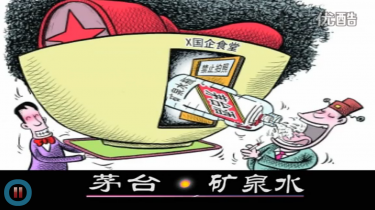China's crackdown on extravagance and banqueting has sent official fine dining underground.
Local governments have turned in-house cafeterias into fine restaurants and hosted lavish private dinners in their homes in order to avoid being seen indulging in public, according to South China Morning Post.
Since last November, China's president Xi Jinping has signalled that he plans to cut back on extravagance when he called a halt to excessive banquets. The policy has a catchy slogan: four dishes and one soup.
State media also reported [zh] that in big cities such as Beijing and Shanghai, some officials have relocated their banquets into the secluded suburban areas or hidden clubs. During the banquet, officials still drink the expensive Chinese liquor Maotai, but with the bottle's label torn off or with the alcohol poured into a water bottle.
The news of these clandestine feasts was soon picked up by other Chinese media.
Web users railed against the practice. While most criticized the officials’ behavior, some pointed out that the fundamental problem lies in the system itself.
“Qi renshi” wrote [zh] sarcastically on popular microblogging site Sina Weibo:

A screenshot of a sarcastic song about officials pouring Maotai into the water bottle(from youku)
Our officials are good at doing underground work! They followed the red tradition well!
A lawyer and consultant explained [zh] his perspective on the history behind official opulence:
中国自古都有“以官为贵”的传统思想,这样的思想不转变,官们就自以为贵,认为享受宴请是理所当然的。从宴请的目的来看,无非关乎名利。因此如要改变宴请坏风气,什么法律约束先放一边,法制当然要完善,最重要的是先从思想上做起来。
Writer Shen Dongjun compared [zh] officials’ “creative” ways to circumvent the crackdown with their inability to accomplish their work:
相当一部分地方官员,让他们为百姓办点实事、解决问题时通常都“
没办法”,而在应对上头的相关条文上,却从不缺乏智慧
If you ask these officials to do something for the public or to solve certain problems, they would say they “can't do anything about it”, but to deal with the crackdown, they are never lacking in wisdom.
Another user “Early Worm” [zh] pointed out the problem lies in the system itself:
真是上有政策,下有对策,说到底根本原因还是制度问题。不改革,
说再多什么话都是屁话,做再多什么事都是白做。 只要中国人每年都挤破头去考公务员,那制度问题就一直存在, 受益的就不会是老百姓。
When there’s a crackdown, they always have a way to deal with it. The fundamental problem is the system itself. Without reform, no matter what the government says or does is useless. As long as Chinese people fight to take the civil servant exam every year, it shows the system has problems. Ordinary people will not benefit from such a system.
“Yuanfang Guandian” wrote [zh] that the policy against extravagance is just for show:
The problem is the crackdown is used to manage public opinion, the anti-corruption is not for real. Because both the top level government and the lower level officials are all corrupted.






